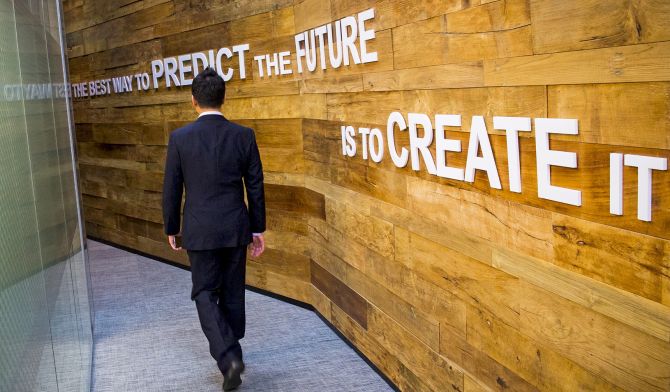As an entrepreneur the most important quality you have to have is that all consuming passion to become an entrepreneur, says Vani Kola, managing director at Kalaari Capital.

What do entrepreneurs, astronauts and artists have in common, other than the fact that they begin with syllable 'Ah'?
Take astronauts. Some moments are indelibly imprinted in our minds. I remember the space shuttle Challenger launch in 1986, the excitement and anticipation leading up to the launch and 73 secs into the flight the sombre disbelief and grief over its explosion. The loss of the young teacher Christa McAuliffe felt deeply personal.
"Sometimes, when we reach for the stars, we fall short. But we must pick ourselves up again and press on despite the pain," Regan said in addressing in the aftermath, a quote that hugely influenced me all my life.
There were other lessons too.
The commission which looked into the disaster concluded, "For a successful technology, reality must take precedence over public relations". That again has been one of my guiding principles throughout my career.
The accident, tragic as it was, is used as a case study for various topics, engineering ethics, dangers of group thinking, decision structures, client intimidation, topics that are relevant even today for start-ups and their management teams to contemplate, but that is another blog for another time.
Let's spend some more time on astronauts. Many kids dream of being an astronaut. Have you ever wondered about the odds of being selected?
In 2013, for example, more than 6,000 people applied for NASA, but only eight individuals were selected. That's 0.1 per cent selection rate.
We, the Venture Capitalists are more accommodating. I believe on an average VCs invest in 2 to 3 per cent of the companies they review, slightly better for start-ups to take off.
Kelly Slack, a psychologist who sits on the astronaut selection panel once said, "It's challenging to pick astronauts for a lot of reasons, primarily because we are predicting behaviour so far in the future".
Also, the job the astronauts are selected for is probably not going to be the job they have by the time they fly. Sounds familiar to me.
It is challenging to pick entrepreneurs for a lot of reasons, primarily because returns depend on predicting behaviour based on future pivoting and the selected entrepreneurs will have to do a different job than what they have done to date. They have to lead an enterprise in order for mission landing, i.e, landing a unicorn for the VCs and themselves.
Again, NASA looks for intelligence, adaptability, physical condition, mental endurance, education in their astronauts, and it runs extensive tests to get data to decide on each candidate.
On the other hand a VC also looks for the same traits in an entrepreneur but runs no tests and usually has limited time to make the decision.
Artists are a different breed, compared to astronauts.
A typical astronaut is methodical, time bound, left brained, the kind of person who would draw a check list and adhere to it to the last. A typical artist on the other hand tends to be impulsive, tends to muse, rather than by the clock, right brained and the kind of person who would let his instincts guide him rather than a check list.
Again, astronauts tend to be team players, systematic, and like to have as much clarity in communication as possible and reduce all the uncertainty that is humanly possible. Artists tend to be individualistic, they seek and thrive in chaos, communicate in metaphors and seek and find hidden meanings in ordinary objects.
These qualities might be daunting to some, but it's these qualities that help them be creative, inspire them to explore new territories, and push the boundaries, and find out new things.
What about entrepreneurs? In my view, entrepreneurs need to be both astronauts and artists. They need both precision and creativity.
When it comes to having a vision, when it comes to coming up with a product or a service that even customers don't know they want, they need to be like artists. And when it comes to execution, turning that vision into a product or a service that a customer is willing to pay, they need to be like astronauts -- systematic, precise and methodical.
Both are demanding, and both are exciting. I know something about this. I have spent last two decades on two sides of the table, about a decade as an entrepreneur and another as a venture capitalist. That affords me to have a perspective through personal experience.
A recent evening, while stuck in Bangalore I wondered how does the journey of an entrepreneur start.
How does an entrepreneur decide when to take the plunge? Is he a technician -- following a precise path, or is he an artist -- guided by his passion and instincts?
Do they wait till they reach certain age, or have a certain amount in the bank balance, or wait for ideal business environment, or wait till they put together the perfect team, or once they move to a perfect location?
Age is no longer a factor, it might actually favour the young.
The stories of young entrepreneurs abound. Bill Gates was still a student at Harvard when he decided to drop out and start Microsoft Similarly, Mark Zuckerberg was just 20, when he dropped out of college to start Facebook.
Old age shouldn't deter you either. Gordon Bowker was 51 when he co-founded Starbucks, although it was really Howard Schultz, CEO, who really created the Starbucks we know today.
Ferdinand Porsche was 56 when he founded Porsche. We have great examples in our own back yard, Bhavish Aggarwal, founder of Ola Cabs, Kunal Bahl of Snapdeal, Ritesh Agarwal of Oyo Rooms all started in their 20's.
Your bank balance doesn't matter. Entrepreneurs don't wait to have a million dollars in their bank account before they start up.
Rather, they start-up so they can have a billion dollars in their bank account soon.
One of the defining images of start-ups -- that they are started in garage -- also underlines the fact that many entrepreneurs aren't exactly flush with cash when they start up. They make do with whatever resources they have. They borrow from friends and family.
They do their planning not in board rooms, but in their dorm rooms, they conduct interviews not in corner offices but in cafes. They stretch their limited resources to the fullest, and think of innovative ways to find some.
Twenty five or thirty years ago, entrepreneurs in India didn't have it easy.
They had to wait for months to get a telephone line, Forex was hard to come by, it was too complex to import computers and computer parts, and India didn't have the same reputation it has today.
Yet, it didn't stop entrepreneurs to start up, and build iconic companies.
Today, it's a different story. India might be ranked 130 in the ease of doing business -- a list that World Bank publishes based on criteria such as how easy it is to start a business, getting credit, paying taxes etc. but it's the second fastest growing start-up country. Prime minister Narendra Modi's slogan start-up India, Standup India reverberates across the country. Entrepreneurship is in the air everywhere.
You just have to go to any campus and you see this clearly.
Similarly, entrepreneurs don't wait for the best team to assemble before they start up. Entrepreneurs don't have the luxury to wait. Entrepreneurs just start up. Their vision, passion and momentum attract great people -- and eventually they end up with the dream team.
They don't wait for the perfect business plan either.
Don't get me wrong. Business plans are important. Without one, you have no business to be in business. But, there is nothing like the perfect business plan.
A plan is just a plan, and it changes whenever it meets the reality. These can be small, and sometimes a complete pivot. The team behind Twitter were building a podcast service when the entry of Apple into the segment changed everything. They quickly pivoted and the result was Twitter.
So, when to start a start-up?
You really have to look within.
Do you feel the burning desire to become an entrepreneur? Do you have a vision that consumes you?
Do you want to change the world with your work?
Do you spend your days and nights thinking about starting up, as if you are madly in love with the idea?
Do you have the confidence to find your way in the world? Are you good at failing and quickly recovering, facing rejection, facing your doubts?
Are you an optimist?
Do you feel the flow of adrenaline when you think of the things you can achieve as an entrepreneur, the problems you can solve, the challenges you can take on, the passion you can kindle in others?
Then you are ready for starting up.
Detailed business plans, money, team -- they are all important. But as an entrepreneur the most important quality you have to have is that all consuming passion to become an entrepreneur.
If you have it, what are you waiting for? Get into the game. Today. Now!
Lead image used for representational purposes only. Image: Reuters
This article earlier appeared on Medium.










